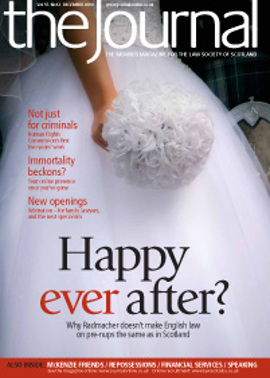Agreeing to disagree

Arbitration has been very much talked up as the way forward in this jurisdiction since the passing of the Arbitration (Scotland) Act 2010. But in divorce cases? Yes, even there, according to a group of family lawyers, both solicitors and counsel, who believe it offers an attractive alternative for many of the cases that still end up in court despite the current trend towards collaborative arrangements or mediation.
“The new Act wasn’t the impetus, but it’s been very useful in providing the framework for an idea that some of us have been talking about for a few years”, says Morag Wise QC, current chair of the Advocates’ Family Law Association. “Schedule 1 is extremely helpful and has given us a hand with the nuts and bolts of the procedure.”
The newly constituted FLAG(S) – Family Law Arbitration Group Scotland – has been working on a bespoke set of arbitration rules based on the Act, and is now inviting expressions of interest from suitably experienced lawyers in becoming accredited as arbitrators in family law cases.
A training course has been organised to run in February and FLAG(S) hopes to be accrediting people to take on live cases from next April. So what sort of cases are they hoping to attract?
Decision needed
“The difficulty with the collaboration or mediation approach is that you don’t get a determination”, Wise explains. “A few of us were interested in the idea that where you have clients, increasingly those with money, and there is an issue of principle to discuss, they want some sort of determination, but not the publicity that you get with a full Court of Session proof. Clients are asserting the right to privacy, if I can call it that.”
Combined with that, she continues, is that clients are much more interested than they used to be in who will be determining their case. “So we started thinking, what if you could have a mode of resolution that allowed parties (a) to choose the decision maker, and (b) do it relatively privately?”
“When people talk about mediation or collaboration, they always assume there is an agreement there to be had. Many cases are intractable not because parties are behaving badly or being unreasonable, but because there is a difficult judgment call on the valuation or division of a particular asset, on the form of order, or the division of property. The solicitors on each side may have taken a different view and the clients each want to follow the advice they have been given.
“Those are the cases that will go to court because they can’t be resolved without one side caving in. They are intractable because they pose a difficult question in fact or law and we think that the parties will welcome the ability to have them determined by a family law specialist of their choosing.”
Civilising influence
Although almost any alternative is bound to be cheaper than going to court, Wise doesn’t see that as the ultimate driver here.
“We are drawing up rules and practice that should be efficient, and on balance cheaper than court, but that isn’t the main attraction. It’s the privacy, choosing your decision maker, and a more civilised method of solving an intractable dispute than litigation.”
But as an adversarial procedure, is it not still calculated to increase the wounds of marriage breakdown?
“It’s more adversarial than inquisitorial, but the process is designed to be modern and efficient. The arbitrator has power to fix an initial meeting and to talk about what documents are required, whether there is to be evidence, and if so the usual rules will apply.
“In the same way that the commercial court is a bit of a deviation from traditional practices, arbitration lends itself to that as well – the rules provide for that. But by definition, I think that if the procedure is relatively private, and doesn’t involve the sort of court drama that public hearings do, of its nature it will be more civilised. I think it will appeal to the sophisticated client who understands how commercial disputes are resolved.”
She adds that the concept is flexible enough to be used for a specific issue within a dispute, and could speed an overall resolution. “In the Court of Session, for example, it’s not straightforward procedurally if you want to have an argument over what was the relevant date. You need a special application to determine that, and then it can be another year before you get a date for the full proof. Or it might be the valuation of a specific asset, with competing expert reports. Or one party claims that an agreement was not fair and reasonable at the time it was entered into. Each of these issues could be resolved relatively simply by arbitration.”
With a full-blown proof, clients sometimes think they lose control over the number of matters to be determined, and issues of behaviour can be dredged up because the other side thinks they will look good in cross examination. “In arbitration, they have a control of the proceedings that you really can lose once you’re in open ended litigation.”
Scope of agreement
Nor does Wise rule out the procedure even in child-centred disputes. “Why not? Just as people can resolve disputes about children without involving the courts at all, in principle there is no reason why you couldn’t arbitrate. But the focus of our group is on financial provision cases.”
There are, of course, limits to the powers of an arbitrator which stop short of the actual grant of divorce – but that applies to any out-of-court settlement. “What we’ve done is write it into the rules that the arbitrator will have to decide the dispute in accordance with the principles of Scots law and although normally only the court can make a formal award of financial provision, by remitting to arbitration, parties agree that the arbitrator will have power to make such provision as a court could on divorce. That will include ordering transfer of property and an order for payment of a capital sum.”
Pension sharing as well: the arbitrator could require parties to implement such a provision in an award, if they sign up to that in advance. “It’s worded so that the arbitrator is not trying to be a court but can do all the things a court can do. You might not accept that there should be pension sharing, but if you sign up, you agree to accept any award.”
Exploring all options
For once this is not a development that is simply being imported from England or elsewhere, although FLAG(S) discovered that a similar group has been emerging south of the border more or less in parallel. “We’ve had informal communications and they have been generous in giving us information about what they are doing”, says Wise. “But there’s no direct relationship there.”
With an almost bewildering array of tools now on offer in the family law field, from collaborative law at one end of the scale to full-blown litigation at the other, are family lawyers each to be expected to embrace them all? Wise believes that a split is already emerging between collaborative and adversarial family lawyers, including some geographical variations.
“Aberdeen uses collaborative law all the time. It’s really taken off there. It’s a little less popular in Edinburgh, perhaps because counsel and the Court of Session are readily available.”
She adds: “In a sophisticated legal system there is room for – and a duty to offer the client in a family breakdown situation – as many opportunities for resolution of that situation as possible. I see it very much as a spectrum of possibilities where many will always be on the left side of a sliding scale. Negotiation, collaboration and mediation between them account for about 70% of cases with the other 30% in the litigation category. Perhaps half of the latter would go to arbitration instead, because when the options are explained to the client, we will see litigation become even more of a last option than it is at present.”
Wise disclaims any particular professional self-interest in the concept. “Because I’ve spent my life running proofs, people say you must want to see things done that way. But I do that because people ask me to, and I say reach agreement in your dispute if you can.
“There are already a range of options available and by adding one in the current climate where arbitration is a well-understood concept, all we’re doing is importing a concept that has been used in commercial or construction disputes for many years and creating a family law model.”
FLAGged up
The current FLAG(S) steering group will form a committee and invite solicitors and advocates to apply to become members of FLAG(S), which will be non-profit making and non-subscription.
Membership criteria will be objective, says Morag Wise, so that you don’t have a self-appointed committee exercising a discretion. Solicitors will need to be accredited specialists in family law or to have been in practice for about seven years. For counsel, it will be seven years in practice with a material family law element and references.
“The most important thing is that we will offer a training course and for someone to offer their services as an arbitrator they will have to have completed that.”
The first one is from 25-27 February 2011 at the Ballathie House Hotel, Perthshire, led by John Campbell QC, former President of the Scottish Institute of Chartered Arbitrators – and there may not be another for a couple of years.
“We decided that everyone will have to undergo this training before they offer their services, but we won’t be a regulatory body, just a collection of individual practitioners who want, as such individuals, to offer arbitration services. People who want to use us would select a suitable arbitrator and we have drafted an agreement to arbitrate covering costs etc.”
Arbitrators will set their own fees and there will be a general rule of joint and several liability.
FLAG(S) hopes that the service itself will be up and running in April 2011.
In this issue
- Guidance on evidential requirements for salmon fishing titles
- The problem of drug misuse: the Portuguese alternative
- Winter wondering
- Targeting best value
- Wedded to the pact?
- Human = people
- Fee changes in New Year
- Choosing friends
- Digital death
- Evolution or revolution?
- Agreeing to disagree
- Commercial sense
- Justice: the election target
- Law reform update
- Roadshows bring in hundreds
- Save our system
- Gill moves a step closer
- Member benefits grow
- Ask Ash
- Social media - Trojan horse?
- Speaking legally
- Setting your priorities
- Problems of definition
- A fishy business
- Creating a jigsaw
- One size fits all?
- Scottish Solicitors' Discipline Tribunal
- Website review
- Book reviews
- Climate change, culture change
- Default position
- Contaminated land guidance revised
- New and improved






